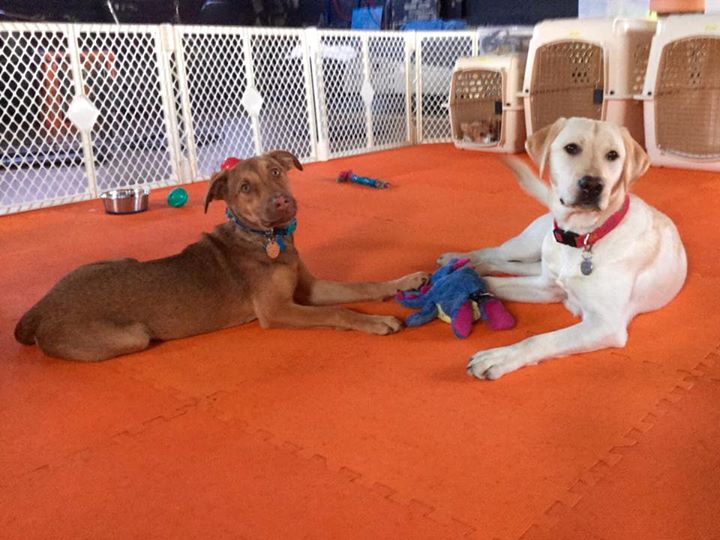
Katherine Ostiguy, KPA CTP, noticed an unmet need among clients and prospective clients in her area, despite having helped and satisfied many owners and dogs over the years through her businesses Crossbones Dog Agility and Spring Forth Dog Services. That need was for a special and unique service to care for and train very young puppies and those puppies that need more care than what puppy classes can supply. In addition to the training, behavior, and daycare services that she offered, Katherine envisioned a facility that would focus on daycare and training for puppies—particularly for puppies younger than four months and puppies that did not fit well into standard early-socialization puppy classes. Her idea was actualized when she was offered more training space by neighboring business Roam Dog Club.
Katherine’s intriguing new service is Puppy Day School; she calls it “a fun alternative to puppy classes.” Puppy Day School is a combination of daycare and training for puppies 8 weeks to 8 months old. A group program with 3-10 puppies at a time, it maintains a 5:1 ratio of puppies to instructors. It is like “private school for your puppy!” according to Katherine. Comparing Puppy Day School to private school helps Katherine differentiate her program from the alternatives: “home school” and “public school.” When an owner teaches his or her puppy at “home” one-on-one, it’s hard to build up enough socialization for the puppy. Some puppies don’t do well in a more “public” dog daycare with adult dogs, or in a class with 8-12+ dogs. The routine at Puppy Day School mimics the “school day” for human kids. Trainers are with the puppies from 8:00 am to 4:00 pm, Monday through Friday. Each school day consists of playing with the other puppies, one-on-one training sessions with the instructors, group training sessions, and plenty of nap time!
For puppies that need, or just would benefit from, more support or socialization than a regular puppy class can offer in order to get on the road to positive behavior Puppy Day School can be the solution. “Sometimes 10-20 minutes of puppy playtime in a weekly hour-long group class is not enough time for puppies to develop their play skills and hone their bite inhibition,” says Katherine. Puppy Day School meets all of the socialization and developmental needs of puppies; Katherine sees the evidence of this in the speed with which puppies’ behaviors improve.
All sorts of puppies are benefitting from Katherine’s new approach to the early weeks and months of puppy training, socialization, and daytime care. One clear example of a dog and family reaping these benefits is the story of a recent client. The dog, a herding breed, was an “only dog.” Her owners had experience with various dog sports and knew the challenges a singleton pup can present with dog-dog behavior and bite inhibition. This dog has been attending Katherine’s Puppy Day School 3 times per week since she was 11 weeks old. In the opinion of Katherine and her staff her play behavior with other dogs is completely age-appropriate now, at 15 weeks old. “When she started here she was nervous around dogs that did not ‘look’ like the herding breeds she was used to at home, but she now plays with all of the other puppies, big and small, with confidence and kindness,” says Katherine.
Special students
Katherine and her clients have found that the alternative of Puppy Day School has elicited some absolutely incredible behavior change in a special population—fearful and aggressive puppies. “We can make progress with these puppies infinitely faster than an owner can, because we know how to set the puppy up for success and keep him under his threshold for eliciting that behavior.” Katherine describes tremendous improvement in fearful and aggressive puppies in just 2-3 sessions of Puppy Day School. “We have had several fearful puppies (some exhibiting aggression, some completely shut down) that go from crawling in on their bellies or trying to bite us on Day 1 to dragging their owners into the building and leaping into our arms on Day 3.”
One puppy Katherine is working with currently is an excellent example of demonstrated progress in a fearful dog. This puppy was referred to Katherine by a veterinarian who has enrolled in some of Katherine’s classes. According to the pup’s owner, he would:
lunge and bark at unfamiliar dogs and people
try to bite the veterinarian and her techs
drool profusely and throw up in moving vehicles
refused to walk on a leash
need to be carried up the stairs
resource guard food and toys from her young children
often "bite" when handled
soil his crate (#2) on a regular basis
When he was assessed by Katherine at the age of 12 weeks, he was covered in drool from car anxiety, and lunged and snapped at her. Forty-five minutes later he would bark in alarm if Katherine made direct eye contact or moved suddenly. After an hour the dog would take tossed treats, but Katherine noticed that he still had his hackles up and would growl when she moved.
Katherine describes what happened when this pup attended his first day of Puppy Day School:

This once fearful puppy
is now a confident veteran.
“He ‘greeted’ my other trainer with a near-bite and urinated on himself. But, after about two hours, he settled in and would eat treats from her and cuddle up to her for reassurance. The next day, he ‘greeted’ me the same way, but within 15 minutes he was working for treats from two of us."
Now this puppy is a confident veteran after attending 10 days of Puppy Day School. He trots into the building eagerly, wiggles at the front gate to be let in, and flies up the stairs to the training space. He plays with all of the other puppies that attend the program, puppies ranging in size from 12-70 pounds. He shares toys with people and other puppies. Katherine says that she and her staff have introduced him to visitors without incident. For his one-on-one training sessions they even bring him down to the daycare lobby to watch excited daycare dogs rush into the building along with their frazzled owners. Not only that, but Katherine shares that the once terrified puppy now is happy to be picked up, rolled to his back, examined all over, and have all of his nail trimmed. “To be clear, this puppy is not out of the woods. He is likely to hit developmental fear periods as he grows, and the progress needs to be maintained by his family (the family plans to continue to send him twice a week through puppyhood,” acknowledges Katherine.
For puppies exhibiting concerning behavior, such as resource-guarding, leash reactivity, or aggression during handling, Katherine recommends starting off by attending Puppy Day School five days per week (“fulltime”) for a month, and then attending “part-time” (2-4 days per week) after that.
A win-win

A pair of older puppies relaxing together.
Another success that Katherine has seen from Puppy Day School is with unruly and boisterous puppies that need a crash course in good behavior. For example, Puppy Day School has had puppies enter at 6-7 months of age with no training beyond a “sit” behavior. “Due to the immersive nature of the program, their owners saw a huge change in their behavior in just a few days,” reports Katherine. “The puppies were calmer and quieter in their crates, jumped up on owners less frequently, were less likely to try to steal food, and began sitting when they saw something that they wanted.”
Puppy Day School presents benefits for owners, as well as the dogs. Katherine explains that some owners do not have the time to take a puppy to different places or to meet different people. Puppy Day School is extremely valuable for owners who are overwhelmed with their puppy's behavior, or for owners with especially fearful or aggressive puppies. “Often these two groups overlap—overwhelmed owners with fearful or aggressive pups. We step in and take the emotion out of it. The owner gets a break and we get results more quickly, so the bond between the owner and dog can be restored. “
Announcing Dog Day School!
Katherine is excited to share that Puppy Day School has been so successful that she has just added Dog Day School, the same program for dogs 8 months and older. “We have had requests for this program from clients with older dogs—and some of our Puppy Day School regulars just don’t want to leave!” Dog Day School includes a greater emphasis on “physical education,” like fetch, tug, long walks, and even agility training (Katherine is an avid, and successful, agility competitor herself). Social time is optional.
The Day School model is working for older dogs, as well as for those with individual issues. Dog Day School can be a daytime care solution for dogs that, for one reason or another, don't do well in a traditional play-all-the-time daycare setting. “We have one dog with a heart condition that needs limited and closely-monitored playtime because he tires quickly,” says Katherine. “Another dog with an over-the-top play style does better playing one-on-one with a staff member for awhile before he gets to play with carefully selected canine buddies. These dogs' needs can't be met by most daycares—they just don't have the resources to do that monitoring.”
Another positive option
When “public” training and care offerings don’t match up with the specific needs of a dog and/or his owner, the Puppy Day School/Dog Day School model can be the answer. Directed learning that focuses on a dog’s individual needs can result in an “especially” delightful special dog!
Editor’s note
To learn more about Katherine Ostiguy, click here to read a profile of her as the KPA CTP of the month of July 2013. Click here to read about Katherine’s recent opportunity to attend the Westminster Masters Agility Championship. To learn more about teaching traditional puppy classes, check out KPA's Puppy Start Right for Instructors course.



Post new comment